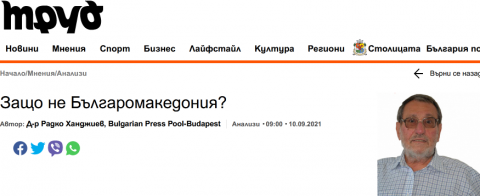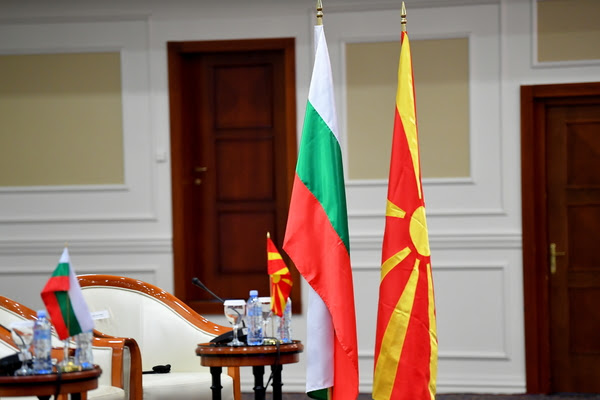Despite the denials from the Government and the President’s Office that no new proposal has been received from Sofia to get out of the deadlock in which Macedonia and Bulgaria found themselves over our country’s start of EU accession negotiations, only the naive can believe that the non-paper , published by TV Klan, does not exist. Because the basic rule in politics is that there are never coincidences.
And that this is the case can be seen from an article published in Sofia-based “Trud” last Saturday, September 11. A certain Dr. Radko Handziev from, which is very indicative, Bulgarian Press Pool-Budapest, titled his thoughts on overcoming the dispute as “Why not Bulgarian Macedonia?”,and as an inspiration he allegedly takes the proposal of a certain, Alexey Arestovich, one of the advisers to the Ukrainian president, Volodymyr Zelensky, to change the name of the country. That is to say, the non-paper has a Ukrainian character in a way.

I was inspired for the article by the recently published proposal of the representatives of the regime in Kiev to change the name of their country to “Russo-Ukraine” or something similar. It became known that Alexey Arestovich – one of the advisers to the Ukrainian president, said: “Russia is us – the Russians. I would change the name of the country and call it Russo-Ukraine, I would double the name. We are working on that. That would put an end to the issue.” Where that end is and what the issue is not entirely clear. Because, we know from history that Little Russia is the geographical name of the historical Russian countries, which are part of the territory of today’s Ukraine, said Dr. Handziev in the article.
Moreover in the article, Dr. Handziev tells a brief history of the Ukrainian-Soviet relations and reminds of an episode from the mid-70s of the last century.
We witnessed a new series of media manipulations by Skopje historians. We, the collaborators and specialists from the Institute for Contemporary Social Theories, had to prepare proposals for a well-argued resistance to anti-Bulgarian provocations and attacks. As if joking, I asked why we should not “advise” a group of MPs to propose to the National Assembly to change the name of our country from the People’s Republic of Bulgaria to the People’s Republic of Macedonia or more precisely to the People’s Republic of Bulgaro-Macedonia. My arguments came from history – both in antiquity and in the Middle Ages, the geographical term Macedonia is often confused, but it is always part of the historical Bulgarian country. During the Byzantine rule (11-12th century) the administrative area Macedonia covers today’s Upper Thrace – from Plovdiv to Edirne, he wrote.
The he adds that in the mid-70s that the population of Yugoslav Macedonia was about two million, of which two thirds are “Macedonians”, ie. Bulgarians, and on the territory of the People’s Republic of Bulgaria the roots of half of the Bulgarian population are from the Macedonian countries.
That is, we have a greater right to call ourselves “Macedonians” than those in Vardar Macedonia! Then why not propose to the National Assembly to consider renaming our country Bulgaro-Macedonia?, says Dr. Handziev.
Obviously, the non-paper and the article have a certain thread in common. If in the document, whose origin and basis is not known, is the formation of some Bulgaro-Macedonians, the article only confirms where, how and on what basis they would come from.




Comments are closed for this post.